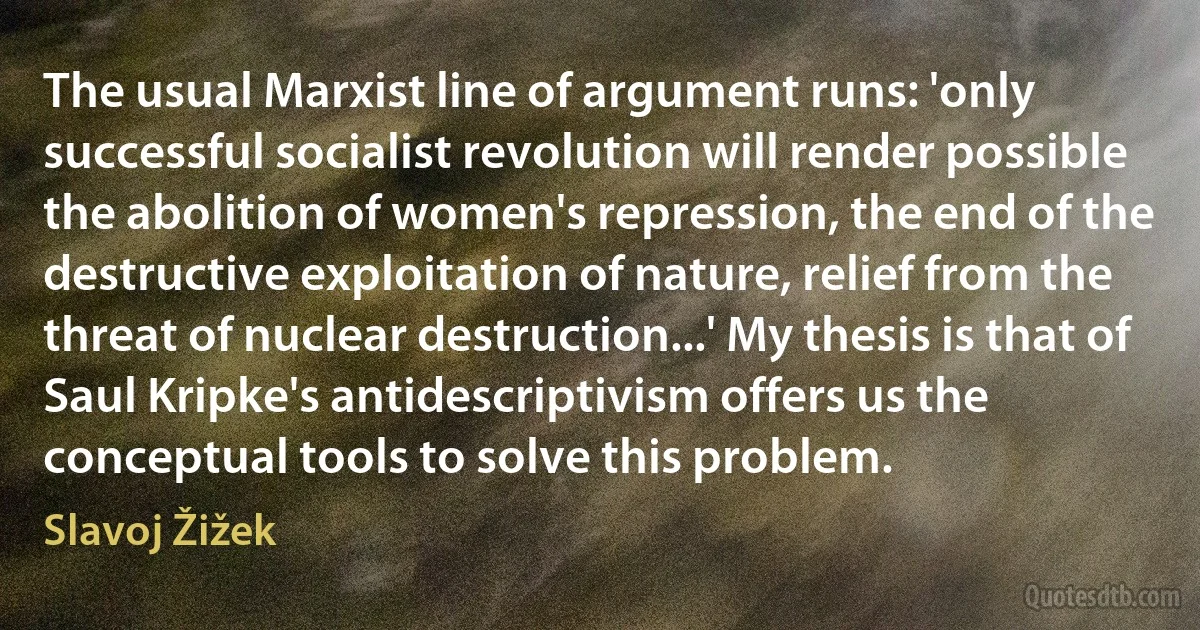Slavoj Žižek quotes - page 2
Slavoj Žižek is a Slovenian philosopher and cultural critic, recognized for his provocative interpretations of ideology, psychoanalysis, and pop culture. His work combines elements of Marxism, Lacanian psychoanalysis, and contemporary philosophy. He is widely known for his dynamic public speaking and distinctive critical style. Here are 107 of his quotes:
In our post-modern, how ever we call them, societies we are obliged to enjoy.
Enjoyment becomes a kind or a weird perverted duty.
The paradox of Coke is that you are thirsty - you drink it but, as everyone knows the more you drink it the more thirsty you get.
A desire is never simply the desire for certain thing.
It's always also a desire for desire itself.
A desire to continue to desire.
Perhaps the ultimate horror of a desire is to be fully filled-in, met - so that I desire no longer.
The ultimate melancholic experience is the experience of a loss of desire itself.
It's not that in some return to a previous era of natural consummation where we got rid of this excess and were only consuming for actual needs like you were thirsty,
you drank water, and so on.
We cannot return to that.
The excess is with us forever.
So, let's have a drink of Coke.

Slavoj Žižek
Canned laughter: After some supposedly funny or witty remark you can hear the laughter and applause included in the soundtrack of the show itself - here we have the exact counterpart of the Chorus in classical tragedy; it is here that we have to look for 'living Antiquity.' That is to say, why this laughter? The first possible answer - that it serves to remind us when to laugh - is interesting enough, because it implies the paradox that laughter is a matter of duty and not of some spontaneous feeling; but this answer is not sufficient because we do not usually laugh. The only correct answer would be that the Other - embodied in the television set - is relieving us even of our duty to laugh - is instead laughing for us. So even if, tired from a hard days stupid work, all evening we did nothing but gaze drowsily into the television screen, we can say afterwards that objectively, through the medium of the other, we had a really good time.

Slavoj Žižek
One should oppose the fascination with Hitler according to which Hitler was, of course, a bad guy, responsible for the death of millions - but he definitely had balls, he pursued with iron will what he wanted. ... This point is not only ethically repulsive, but simply wrong: no, Hitler did not ‘have the balls' to really change things; he did not really act, all his actions were fundamentally reactions, i. e., he acted so that nothing would really change, he stages a big spectacle of Revolution so that the capitalist order could survive.”
In this precise sense of violence, Gandhi was more violent than Hitler: Gandhi's movement effectively endeavored to interrupt the basic functioning of the British colonial state.

Slavoj Žižek
It is also crucial to bear in mind the interconnection between the Decalogue... and its modern obverse, the celebrated 'human Rights'. As the experience of our post-political liberal-permissive society amply demonstrates, human Rights are ultimately, at their core, simply Rights to violate the Ten Commandments. 'The right to privacy' - the right to adultery, in secret, where no one sees me or has the right to probe my life. 'The right to pursue happiness and to possess private property' -- the right to steal (to exploit others). 'Freedom of the press and of the expression of opinion' -- the right to lie. 'The right of free citizens to possess weapons' -- the right to kill. And, ultimately, 'freedom of religious belief.

Slavoj Žižek
They are trying as directly as possible to sell you experiences, i. e. what you are able to do with the car, not the car as a product itself. An extreme example of this is this existing economic marketing concept, which basically evaluates the value of you as a potential consumer of your own life. Like how much are you worth, in the sense of all you will spend to buy back your own life as a certain quality life. You will spend so much in doctors, so much in beauty, so much in transcendental meditation, so much for music, and so on. What you are buying is a certain image and practice of your life. So what is your market potential, as a buyer of your own life in this sense?

Slavoj Žižek
Here we could use the distinction elaborated by Kovel's White Racism - between dominative and aversive racism. In Nazi ideology, all human races form a hierarchical, harmonious, whole (the 'destiny' of the Aryans at the top is to rule, while the Blacks, Chinese and others have to serve) a all races except the Jews: they have no proper place; their very identity is fake, it consists in trespassing the frontiers, in introducing unrest, antagonism, in destabilizing the social fabric. As such, Jews plot with other races and prevent them from putting up with their proper place - they function as a hidden Master aiming at world domination: they are a counter-image of the Aryans themselves, a kind of negative, perverted double; their is why they must be exterminated, while other races have only to occupy their proper place.

Slavoj Žižek
The analysis achieves its end when the patient is able to recognize, in the Real of his symptom, the only support of his being. That is how we must read Frued's 'wo we war, soll ich werden:' you, the subject, must identify yourself with the place where your symptom already was; in its pathological particularity you must recognize the element which gives consistency to your being.

Slavoj Žižek
This is probably the fundamental dimension of 'ideology': ideology is not simply a 'false consciousness', an illusory representation of reality, it is rather this reality itself which is already to be conceived as 'ideological' - 'ideological' is a social reality whose very existence implies the non-knowledge of its participants as to its essence -that is, the social effectivity, the very reproduction of which implies that the individuals 'do not know what they are doing'. 'Ideological is not the false consciousness of a (social) being but this being itself in so far as it is supported by "false consciousness"'. Thus we have finally reached the dimension of the symptom, because one of its possible definitions would also be 'a formation whose very consistency implies a certain non-knowledge on the part of the subject': the subject can 'enjoy his symptom' only in so far as its logic escapes him - the measure of the success of its interpretation is precisely its dissolution.

Slavoj Žižek
The source of totalitarianism is a dogmatic attachment to the official word: the lack of laughter, of ironic detachment. An excessive commitment to Good may in itself become the greatest Evil: real Evil is any kind of fanatical dogmatism, especially exerted in the name of supreme Good... Consider only Mozart's Don Giovanni at the end of the opera, when he is confronted with the following choice: if he confesses his sins, he can still achieve salvation; if he persists, he will be damned forever. From this viewpoint of the pleasure principle, the proper thing to do would be to renounce his past, but he does not, he persists in his Evil, although he knows that by persisting he will be damned forever. Paradoxically, with his final choice of Evil, he acquires the status of an ethical hero - that is, of someone who is guided by fundamental principles beyond the pleasure principle and not just by the search for pleasure or material gain.

Slavoj Žižek
Ideology is not simply imposed on ourselves.
Ideology is our spontaneous relationship to our social world how we perceive each meaning and so on and so on.
We in a way enjoy our ideology.
To step out of ideology it hurts.
It's a painful experience.
you must force yourself to do it.
The extreme violence of liberation.
You must be forced to be free.
If you trust simply your spontaneous sense of well-being or whatever - you will never get free.
Freedom hurts.

Slavoj Žižek
Slavoj Žižek

Photo:
Amrei-Marie,
CC BY-SA 4.0
Occupation: Slovenian Philosopher
Born: March 21, 1949
Quotes count: 107
Wikipedia: Slavoj Žižek














